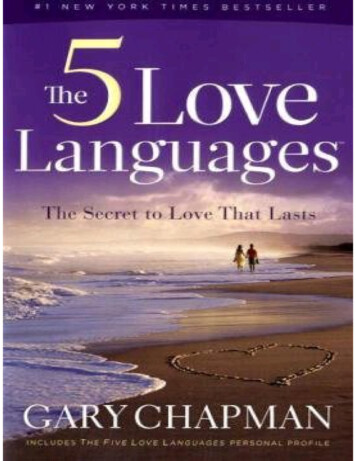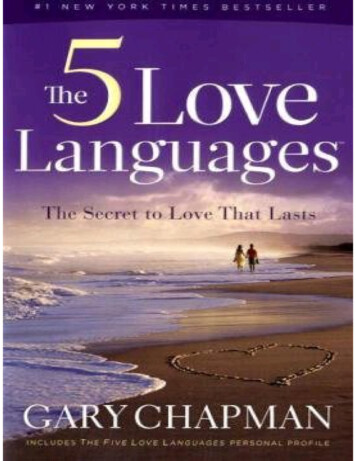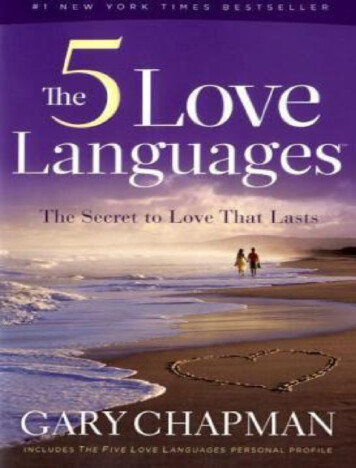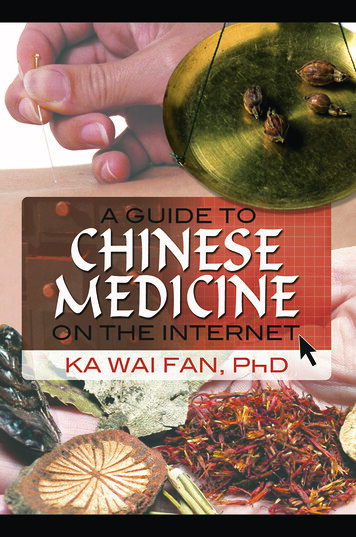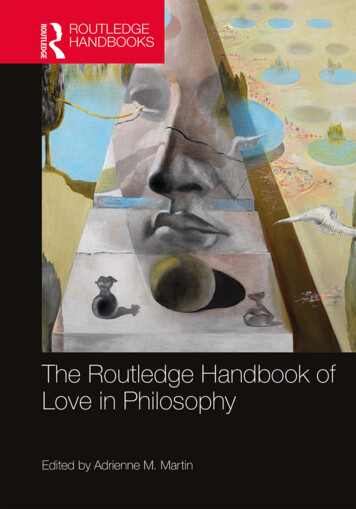
Transcription
THE ROUTLEDGEHANDBOOK OF LOVE IN PHILOSOPHYThe Routledge Handbook of Love in Philosophy collects 39 original chapters from prominent philosophers on the nature, meaning, value, and predicaments of love, presented in a unique framework that highlights the rich variety of methods and traditions used to engage with thesesubjects. This volume is structured around important realms of human life and activity, each ofwhich receives its own section:I. Family and FriendshipII. Romance and SexIII. Politics and SocietyIV. Animals, Nature, and the EnvironmentV. Art, Faith, and MeaningVI. Rationality and MoralityVII. Traditions: Historical and Contemporary.This last section includes chapters treating love as a subject in both Western and non- Westernphilosophical traditions. The contributions, all appearing in print here for the first time, arewritten to be accessible and compelling to non- philosophers and philosophers alike; and thevolume as a whole encourages professional philosophers, teachers, students, and lay readers torethink standard constructions of philosophical canons.Adrienne M. Martin is Akshata Murty ’02 and Rishi Sunak Associate Professor of Philosophy,Politics, and Economics, and George R. Roberts Fellow, at Claremont McKenna College. Sheis the author of How We Hope: A Moral Psychology (2013).
Routledge Handbooks in PhilosophyRoutledge Handbooks in Philosophy are state- of-the- art surveys of emerging, newly refreshed, andimportant fields in philosophy, providing accessible yet thorough assessments of key problems,themes, thinkers, and recent developments in research.All chapters for each volume are specially commissioned, and written by leading scholars inthe field. Carefully edited and organized, Routledge Handbooks in Philosophy provide indispensable reference tools for students and researchers seeking a comprehensive overview of new andexciting topics in philosophy. They are also valuable teaching resources as accompaniments totextbooks, anthologies, and research- orientated publications.Also available:The Routledge Handbook of Philosophy and Science of AddictionEdited by Hanna Pickard and Serge AhmedThe Routledge Handbook of Moral EpistemologyEdited by Karen Jones, Mark Timmons, and Aaron ZimmermanThe Routledge Handbook of Love in PhilosophyEdited by Adrienne M. MartinThe Routledge Handbook of the Philosophy of Childhood and ChildrenAnca Gheaus, Gideon Calder, and Jurgen De WispelaereThe Routledge Handbook of Applied EpistemologyDavid Coady and James ChaseFor more information about this series, please visit: www.routledge.com/Routledge- Handbooks-in- Philosophy/book- series/RHP
The Routledge Handbookof Love in PhilosophyEdited by Adrienne M. Martin
First published 2019by Routledge52 Vanderbilt Avenue, New York, NY 10017and by Routledge2 Park Square, Milton Park, Abingdon, Oxon, OX14 4RNRoutledge is an imprint of the Taylor & Francis Group, an informa business 2019 Taylor & FrancisThe right of Adrienne M. Martin to be identified as the author of the editorial matter,and of the authors for their individual chapters, has been asserted in accordance withsections 77 and 78 of the Copyright, Designs and Patents Act 1988.All rights reserved. No part of this book may be reprinted or reproduced or utilized inany form or by any electronic, mechanical, or other means, now known or hereafterinvented, including photocopying and recording, or in any information storage orretrieval system, without permission in writing from the publishers.Trademark notice: Product or corporate names may be trademarks or registeredtrademarks, and are used only for identification and explanation without intent toinfringe.Library of Congress Cataloging- in-Publication DataA catalog record for this title has been requestedISBN: 978-1-138-18444-2 (hbk)ISBN: 978-1-315-64520-9 (ebk)Typeset in Bemboby Wearset Ltd, Boldon, Tyne and Wear
ContentsNotes on Contributors ixIntroduction Adrienne M. Martin1Part IFamily and Friendship 111 Love and Friendship Diane Jeske132 Early Relationships, Pathologies of Attachment, and the Capacityto Love Monique Wonderly3 “Mama, Do You Love Me?”: A Defense of Unloving Parents Sara Protasi4 Loving and (or?) Choosing Our Children: Disability, UnconditionalParental Love, and Prenatal Selection Joseph A. Stramondo233547Part IIRomance and Sex 595 Love, Romance, and Sex Troy Jollimore61v
Contents6 All Hearts in Love Use Their Own Tongues: Concepts, Verbal Disputes,and Disagreeing About Love C.S.I. Jenkins727 The Normative Potency of Sexually Exclusive Love Jennifer Ryan Lockhart838 Queer Bodies and Queer Love Maren Behrensen939 Plato on Love and Sex Jeremy Reid10510 Eros and Agape in Interpersonal Relationships: Plato, Emerson, and Peirce Daniel G. Campos11611 Threats, Warnings, and Relationship Ultimatums Hallie Liberto128Part IIIPolitics and Society 13912 Love and Marriage Brook J. Sadler14113 Love, Anger, and Racial Justice Myisha Cherry15714 Love and Political Reconciliation Colleen Murphy16915 The Morning Stars Will Sing Together: Compassion, Nonviolence,and the Revolution of the Heart Cheyney Ryan180Part IVAnimals, Nature, and the Environment 19116 Love and Animals: Simone Weil, Iris Murdoch and Attention as Love Elisa Aaltola19317 On the Love of Nature Rick Anthony Furtak205vi
Contents18 Caring to Be Green: The Importance of Love for Environmental Integrity Cheryl Hall215Part VArt, Faith, and Meaning 22719 Love and Beauty in Eighteenth- Century Aesthetics Paul Guyer22920 Love Songs Noël Carroll24221 How Faith Secures the Morality of Love Sharon Krishek25222 What Is This Thing Called Love? Luc Bovens264Part VIRationality and Morality 27523 Reasons for Love Esther Engels Kroeker27724 Reasons of Love Katrien Schaubroeck28825 Love and Agency Kyla Ebels- Duggan30026 Love, Practical Reasons, and African Philosophy Sandy Koullas31327 Love and Moral Structures: How Love Can Reshape Ethical Theory J.L.A. Garcia32528 Moral Normativity and the Necessities of Love Harry Frankfurt33329 Love and Hatred Jens Haas and Katja Maria Vogt344vii
ContentsPart VIITraditions: Historical and Contemporary 35730 The Confucian and Daoist Traditions on Love David B. Wong35931 Love: India’s Distinctive Moral Theory Shyam Ranganathan37132 Love in the Jewish Tradition Lenn E. Goodman38233 Love in Islamic Philosophy Ali Altaf Mian39534 Three Models of Christian Love: Platonic, Aristotelian, and Kantian Eric J. Silverman40935 European Concepts of Love in the 17th and 18th Centuries Gábor Boros42236 Love in 19th-Century Western Philosophy Michael Strawser44137 (The Varieties of ) Love in Contemporary Anglophone Philosophy Benjamin Bagley45338 Love in Contemporary Psychology and Neuroscience Berit Brogaard465Index 479viii
CONTRIBUTORSElisa Aaltola works as a Senior Researcher in Philosophy at the University of Turku, Finland.Her publications include Animal Suffering: Philosophy and Culture (2012), Animal Ethics and Philosophy: Questioning the Orthodoxy (co- edited with John Hadley, 2014), and Varieties of Empathy:Moral Psychology and Animal Ethics (2018).Benjamin Bagley is a Visiting Assistant Professor at the University of Virginia. His publications include “Loving Someone in Particular” and “Properly Proleptic Blame,” both in Ethics.Maren Behrensen is a Post- Doc at the Institute of Christian Social Ethics at the University ofMünster, Germany. Their recent book, The State and the Self (2017), explores the metaphysicsand ethics of identity maintenance in modern societies.Gábor Boros is Professor of Philosophy at Eötvös Loránd University, Budapest, Hungary andProfessor of General Humanities at Gáspár Károli University of the Reformed Church inHungary. Beyond monographs and articles on 17th-century philosophers, he is author of Philosophies of Love (in Hungarian, 2015) and Cult and Culture of Love in China and Europe (togetherwith P. Santangelo and R. Gigliucci, forthcoming with Brill).Luc Bovens is Professor of Philosophy at the University of North Carolina at Chapel Hill. Heco- authored Bayesian Epistemology (with Stephan Hartmann) in 2003.Berit Brogaard is Professor of Philosophy at the University of Miami and a Professor II at theUniversity of Oslo. Her areas of research include philosophy of perception, philosophy of emotions, and philosophy of language. She is the author of Transient Truths (Oxford UniversityPress, 2012), On Romantic Love (Oxford University Press, 2015), The Superhuman Mind (Penguin,2015), and Seeing & Saying (Oxford University Press, 2018).Daniel G. Campos is Associate Professor of Philosophy at Brooklyn College of The CityUniversity of New York. He is the author of Loving Immigrants in America: An Experiential Philosophy of Personal Interaction (Lexington Books, 2017).ix
ContributorsNoël Carroll is a Distinguished Professor in the Philosophy Program of the City University ofNew York. He is the author of Living in an Artworld, Humor: A Very Short Introduction, and ThePhilosophy of Horror.Myisha Cherry is an Assistant Professor of Philosophy at the University of California, Riverside whose research interest lies at the intersection of moral psychology and social and politicalphilosophy. Cherry’s books include The Moral Psychology of Anger co- edited with Owen Flanagan (Rowman and Littlefield, 2018) and Unmuted: Conversations on Prejudice, Oppression, andSocial Justice (Oxford University Press, forthcoming). Her research has appeared in Hypatia,Radical Philosophy Review, and Critical Philosophy of Race as well as mainstream publications likeSalon and The Los Angeles Times.Kyla Ebels- Duggan is Associate Professor of Philosophy at Northwestern University. Shespecializes in moral and political philosophy and their history, working in a broadly Kantiantradition. Her work has appeared in Ethics, The Philosophical Quarterly, Philosophical Studies, andPhilosophers’ Imprint.Harry Frankfurt is Emeritus Professor of Philosophy at Princeton University. He is the authorof numerous articles and books, including Necessity, Volition, and Love (1999) and The Reasons ofLove (2004).Rick Anthony Furtak is Associate Professor of Philosophy at Colorado College. He is theauthor of Wisdom in Love: Kierkegaard and the Ancient Quest for Emotional Integrity (2005) andKnowing Emotions: Truthfulness in Affective Experience (2018). He has also published a translationof Rilke’s Sonnets to Orpheus (2007).J.L.A. Garcia is Professor in Boston College’s Philosophy Department. Garcia served on theAmer ican Philosophical Association’s Committee on Hispanics and chaired its Committee onPhilosophy and Black Experience. His article, “The Heart of Racism,” from The Journal of SocialPhilosophy, has been widely reprinted, sometimes in translation.Lenn E. Goodman is Professor of Philosophy and Andrew W. Mellon Professor in theHumanities at Vanderbilt University. His books include Judaism: A Contemporary PhilosophicalInvestigation (Routledge, 2016), On Justice (2008), Creation and Evolution (Routledge, 2010), InDefense of Truth: A Pluralistic Approach (2001), God of Abraham (1996), and his Gifford Lectures:Love Thy Neighbor as Thyself (2008).Paul Guyer is the Jonathan Nelson Professor of Humanities and Philosophy at Brown University. He is the author of many works on the philosophy of Immanuel Kant, including Kant andthe Claims of Taste (1979), Kant and the Experience of Freedom (1993), and Kant (2006) in the“Routledge Philosophers” series. He is also the editor of Kant’s Critique of the Power of Judgmentand of several multi- author collections on Kant’s aesthetics. He recently published A History ofModern Aesthetics in three volumes (2014). He is currently writing a monograph on Kant andMoses Mendelssohn.Jens Haas trained as a lawyer specializing in criminal appeals law and now works on agency andignorance. He is interested in the reasons and causes that figure in crimes like murder and inthe nature of life- changing actions. He recently began to co- author papers in normativex
Contributorse pistemology and value theory with Katja Maria Vogt, for example “Ignorance and Investigation” in The Routledge International Handbook on Ignorance (2015).Cheryl Hall is Associate Professor in the School of Interdisciplinary Global Studies at theUniversity of South Florida. Her recent publications include “What Will It Mean to Be Green?Envisioning Positive Possibilities Without Dismissing Loss” (2013) and The Oxford Handbook ofEnvironmental Political Theory, which she co- edited (2016).C.S.I. Jenkins is Canada Research Chair and Professor of Philosophy at the University ofBritish Columbia, and Principal Investigator on the SSHRC- funded interdisciplinary research/creation project “The Metaphysics of Love.” Her book, What Love Is and What It Could Be,appeared in 2017.Diane Jeske is a Professor of Philosophy at the University of Iowa. Her research areas areethics, history of ethics, political philosophy, and philosophy of law. She is the author of Rationality and Moral Theory: How Intimacy Generates Reasons (Routledge, 2008) and The Evil Within:Why We Need Moral Philosophy (Oxford, 2018).Troy Jollimore is Professor of Philosophy at California State University, Chico. His philosophical books include Love’s Vision (Princeton University Press, 2011) and On Loyalty(Routledge, 2012). His books of poetry include Syllabus of Errors and the National Book CriticsCircle Award- winning Tom Thomson in Purgatory.Sandy Koullas is currently a Postdoctoral Fellow in the Expository Writing Program at JohnsHopkins University and teaches part- time in the Philosophy Department at GeorgetownUniversity. She completed her doctoral dissertation, On the Value of Relationships, at JohnsHopkins University in 2017.Sharon Krishek is a Lecturer in the philosophy department at the Hebrew University of Jerusalem, Israel. She is the author of Kierkegaard on Faith and Love (2009) and Kierkegaard’s Philosophyof Love (2011, in Hebrew).Esther Engels Kroeker is a Post- Doctoral Fellow at the University of Antwerp. She is interested in the history of modern philosophy, and especially in the moral philosophy of ThomasReid and David Hume, as well as in the contemporary discussion of love and practical reasons.Together with Katrien Schaubroeck, she edited the volume Love, Reason and Morality (2017),and has published various articles on love, morality, and the work of Reid and Hume.Hallie Liberto is an Associate Professor at the University of Maryland—College Park. Sheresearches topics in normative ethics and social philosophy, such as the nature of rights, exploitation, coercion, consent, and promises.Jennifer Ryan Lockhart is an Associate Professor in the Department of Philosophy at AuburnUniversity. She has research interests in ethics and the history of philosophy, especially the workof Kant and Kierkegaard.Ali Altaf Mian is currently Assistant Professor of Islamic Studies at Seattle University, wherehe teaches classes on the Qur’an, comparative religion and mysticism, and gender and sexualityxi
Contributorsin Islam. He is the author of Muslims in South Asia (forthcoming) and is also working on a manuscript entitled Surviving Modernity: Ashraf ‘Ali Thanvi (1863–1943) and the Politics of MuslimOrthodoxy in Colonial India.Colleen Murphy is Professor of Law, Philosophy, and Political Science at the University ofIllinois at Urbana- Champaign in the United States. She is the author of A Moral Theory of Political Reconciliation (Cambridge, 2010) and The Conceptual Foundations of Transitional Justice (Cambridge, 2017), and is co- author with Linda Radzik of the “Reconciliation” entry in the StanfordEncyclopedia of Philosophy.Sara Protasi is Assistant Professor of Philosophy at the University of Puget Sound, USA. Herprimary research focus is on the moral psychology of emotions, especially love and envy, whichshe investigates in a way that is both empirically minded and historically sensitive. For updatedinfo see: https://saraprotasi.weebly.com.Shyam Ranganathan is a member of the Department of Philosophy and York Center forAsian Research, York University, Toronto. His latest contribution to translation theory includes“Context and Pragmatics” in the Routledge Handbook of Translation and Philosophy (2018). He iscommentator and translator of Patañjali’s Yoga Sūtra (2008) from the Sanskrit, editor and contributor to the Bloomsbury Research Handbook of Indian Ethics (2017), and author of Ethics and theHistory of Indian Philosophy (2007; 2nd edn, 2017) and Hinduism: A Contemporary PhilosophicalInvestigation (Routledge, 2019).Jeremy Reid is a Post- Doctoral Associate at the University of Maryland, College Park. Heworks on the history of ethics and political philosophy, with a specialization in ancient philosophy. His work has appeared in Plato’s Symposium: A Critical Guide (2017).Cheyney Ryan is Senior Fellow, Program in Ethics, Law, and Armed Conflict, University ofOxford, where he is also a member of Merton College. He is also co- chair of the Oxford Consortium for Human Rights which conducts student workshops on human rights and varioustopics in Oxford, New York, and other places. He has been engaged with the politics of nonviolence since becoming involved in the civil rights movement in the 1960s and working withDorothy Day, founder of the Catholic Worker Movement. Most recently, his work has focusedon the dialogue between pacifism and contemporary just war thinking.Brook J. Sadler is Associate Professor of Philosophy in the Department of Humanities andCultural Studies at the University of South Florida. She has published articles on marriage,Kantian ethics, meta- ethics, plagiarism, and philosophical pedagogy. She also publishes poetryand criticism in many literary journals and magazines.Katrien Schaubroeck is Lecturer in Philosophy at the University of Antwerp. Her researchfocuses on practical reasons and the importance of love. She authored The Importance of What WeCare About: A Love- Based Theory of Practical Reasons (2013) and co- edited (with Esther Kroeker)Love, Reasons and Morality (Routledge, 2017).Eric J. Silverman is Associate Professor of Philosophy at Christopher Newport University inthe USA. He has 20 publications on topics in ethics, philosophy of religion, and medieval philosophy. His publications include a monograph, The Prudence of Love: How Possessing the Virtue ofxii
ContributorsLove Benefits the Lover (Lexington Books, 2010), and a co- edited collection, Paradise Understood:New Philosophical Essays about Heaven (Oxford University Press, 2017).Joseph A. Stramondo is Assistant Professor of Philosophy at San Diego State University. Hiswriting focuses on the intersection of bioethics and philosophy of disability and can be found inThe Hastings Center Report, The Kennedy Institute of Ethics Journal, Science and Engineering Ethics,The International Journal of Feminist Approaches to Bioethics, and Social Philosophy Today.Michael Strawser is Professor of Philosophy and Chair of the Department of Philosophy at theUniversity of Central Florida. His recent books include Kierkegaard and the Philosophy of Love(2015), Asking Good Questions: Case Studies in Ethics and Critical Thinking (co- authored, 2015),and Kierkegaard’s God and the Good Life (co- edited, 2017).Katja Maria Vogt specializes in ancient philosophy, normative epistemology, ethics, andtheory of action. She is interested in questions that figure in both ancient and contemporarydiscussions: What are values? What kind of values are knowledge and truth? What is a goodhuman life? She recently began to co- author articles in normative epistemology and value theorywith Jens Haas.Monique Wonderly is an Assistant Professor of Philosophy at the University of California, SanDiego. Much of her recent work concerns the nature and ethics of emotional attachment. Shehas published in the areas of ethics, philosophy of emotion, and history of philosophy.David B. Wong is the Beischer Professor of Philosophy at Duke University. His works inmoral philosophy, moral psychology, and Chinese philosophy include Natural Moralities: ADefense of Pluralistic Relativism (2006).xiii
IntroductionAdrienne M. MartinA two- part idea is at the heart of this Handbook. First, love and loving relationships are a humanconstant, a constant that is a source of reasons, motivation, meaning, and value in human life;but, second, the nature and significance of love and loving relationships vary widely across cultures and times, and even across areas of activity within a single culture and time. Love andloving relationships, what unifies and distinguishes them, what they do for and to us, why wevalue them, and how it is appropriate to value them, are thus natural and important topics forphilosophical inquiry. Unsurprisingly, then, such topics are persistent themes throughout thehistory of philosophical inquiry and thought. They are also enjoying burgeoning attention in thecontemporary literature, and classes on the philosophy of love are regular offerings at many colleges and universities.Both the historical and the contemporary literature on love encompass a broad diversity ofphilosophical methods. Consider: Plato’s Socratic dialogues; experiential and practice- basedforms of Daoism and Confucianism; Kierkegaard’s narratives; a prioristic analysis and synthesisin the traditional Western, Arabic, and Indian canons; philosophical anthropology in the same;ubuntu in sub- Saharan African philosophy; Simone de Beauvoir’s feminism; Iris Murdoch’sliterary- perceptual philosophy; Thoreau’s and Emerson’s transcendentalism; Martin LutherKing, Jr.’s speeches; James Baldwin’s essays; Rawlsian reflective equilibrium; recent experimentally based and neuroscientifically informed methods. All of these, and more, are deployedwithin this volume in service of philosophers’ efforts to understand the nature and significanceof love and loving relationships.When we consider the idea that love and loving relationships are human constants that varywidely across human societies, it is natural to frame a survey of philosophical literature on thesubject by areas of human life and activity. The volume is thus divided into seven Parts: I.Family and Friendship; II. Romance and Sex; III. Politics and Society; IV. Animals, Nature, andthe Environment; V. Art, Faith, and Meaning; VI. Rationality and Morality; and, finally, VII.Traditions: Historical and Contemporary. This framework facilitates access to a broad diversityof methods that have been brought to bear on questions about the nature and significance oflove. Readers may come to this volume with a primary interest in one of these areas, and focuson the contributions within a single Part. However, what has been striking to me, as the editor,is the numerous and fascinating themes that cut across these subject areas, and across the variousphilosophical methods and traditions represented here. I will therefore use this Introduction to1
Adrienne M. Martinhighlight and connect some of these themes, rather than to summarize each individual chapteror section.Diotima’s AscentPlato’s Socratic dialogue, The Symposium, is perhaps the most famous philosophical treatise onlove in Western history. In it, Socrates reports a speech about love he “once heard from awoman of Mantinea, Diotima” (201d). (Pause for a moment to contemplate that Westernphilosophy of love thus begins in large part with a woman’s wisdom.) Diotima’s view is that “togo aright, or be led by another, into the mystery of Love” is to ascend a ladder of appreciationor pleasure in beautiful things, beginning with the beautiful body of a mortal beloved, thenfrom one body to two and from two to all beautiful bodies, then from beautiful bodiesto beautiful customs, and from customs to learning beautiful things, and from theselessons he arrives in the end at this lesson, which is learning of this very Beauty, so thatin the end he comes to know just what it is to be beautiful.(Symposium 211c–d)Love, at the peak of ascent, is pleasure in and knowledge of the Platonic form of Beauty; earthlylove and its pleasures are, it seems, left behind. The reader can find additional discussions of thisview in the chapters by Daniel Campos and Paul Guyer, as well as a detailed bibliography forfurther reading in Jeremy Reid’s chapter. We also see several versions of Diotima’s ascent inMichael Strawser’s chapter on “Love in 19th-Century Western Philosophy,” through the worksof Hegel, Schopenhauer, Kierkegaard, and Nietzsche.Interestingly, Eros and the erotic are, in the contemporary popular imagination, most centrally associated with lust and sex, and “Platonic” love is love between people who do not sexually desire each other. But it is in fact Eros who is the subject of Diotima’s ascent, and thus theview Plato has Socrates adopt from Diotima is that what we would popularly call “erotic love”contains the potential to be trained and transformed first into “Platonic love”—as in “I love you(merely) Platonically”—and finally into a transcendent form of knowledge without attachmentto any of the usual stimuli of erotic arousal or, indeed, to any person or persons at all. I will tracea series of intertwined themes, drawn from this view: The philosophical contemplation of loveoften leads to questions, first, about the relation between carnal erotic love and love—Divine orsecular—oriented away from bodily pleasure and toward goodness or virtue. Second, settingaside or at least decentering attention to physical eroticism, questions arise regarding the relationbetween and relative value of attached or partial love—especially love for particular people suchas romantic interests, friends, or family members—and universal or impartial obligations oriented toward all humanity, or all creation. Third, it is important not to neglect the epistemicdimension of Diotima’s ascent, which brings our attention to another theme running throughseveral chapters in this volume, regarding the idea that loving someone or something constitutesa distinctive kind of perception that generates insight and knowledge about the beloved thatmay be otherwise inaccessible. From here, a fourth theme develops that runs counter to thosewho think loving partiality is in tension with moral obligations or virtue: several chaptersdevelop the idea that love or a loving attitude is the cornerstone of moral theory and practice.In the following, I’ll say a bit about each of these themes in turn, indicating some of the chaptersin which they feature most prominently. I also note chapters that raise skeptical challenges orproblems to the conceptual space within which these themes and questions are articulated.2
IntroductionIs Carnal Love an Obstacle to the Achievement of Virtue?That earthly love is, at best, a diminished reflection and instrument to achievement of a love thatappreciates and comprehends the Divine source of all goodness and beauty is a theme that runsforward from Diotima through the Jewish, Christian, and Islamic theological and philosophicaltraditions: Lenn Goodman, in his chapter on “Love in the Jewish Tradition,” emphasizes thepractical- epistemic dimension of this theme, tracing a route from the practice of grace, piety,justice, and science to knowledge of God and His love. Ali Altaf Mian, in the course of describing a robust, complex, and multi- valenced set of views about human/earthly and divine/heavenly love(s) in his contribution on “Love in Islamic Philosophy,” reports of Ibn Sina (Avicenna),“Humans might commence by loving imperfect instances of goodness and beauty, but theyeventually come to love the ultimate and perfect source of all goodness and beauty, namelyGod” (p. 402). In Gábor Boros’s chapter, “European Concepts of Love in the 17th and 18thCenturies,” this aspect of Diotima’s ascent continues to be central in the work of Nicolas Malebranche, René Descartes, and Mary Astell and John Norris.In several extensions of this view, the lowest rung of pleasure in a beautiful body also presentsa hazard and a potential obstacle to the possibility of ascent. At worst, that is, earthly love and inparticular lustful pleasure in sex is antithetical to virtue and knowledge of Divine goodness andbeauty. In “Plato on Love and Sex,” Jeremy Reid turns from the Symposium to the Laws andPhaedrus, where the central feature of “bad love”—which is bad indeed: controlling, obsessive,jealous, and clingy—is its focus on the beloved’s body. In these texts, there is a “good love”initially inspired by bodily beauty, but it must turn toward the beloved’s character and awayfrom sex and sexual desire. The importance of controlling “carnal love” with reason and directing passion toward either epistemic or political ends is also a central theme running throughseveral of the Islamic philosophies in Mian’s chapter. As for the Christian tradition, Eric Silverman identifies three models of Christian love, and emphasizes that the neo- Platonist model notonly values “spiritual immaterial love over physical earthly love,” but follows on Augustine’sdim view of physical beauty and pleasure in it:What was there, to delight me, except to love and to be loved? Yet, I did not keep tothe bright path of friendship and moderation of loving from soul to soul, instead myheart was darkened, obscured, and overcast by clouds from the polluted lust of theflesh and gushing energy of adolescence, so I could not discern between serene chastelove and the darkness of lust.(p. 412)Secular versions of Diotima’s ascent that take a negative view toward carnal love appear inseveral chapters in this volume. Among the arguments that Troy Jollimore surveys (and critiques) in his chapter, “Love, Romance, and Sex,” is that of Raja Halwani, who sees self- interested sexual desire as incompatible with genuine love, which is supposed to be entirelyother- regarding (p. 63). In her chapter on “Love and Marriage,” Brook Sadler demonstrateshow an Augustinian anxiety about sex d
Humanities at Vanderbilt University. His books include Judaism: A Contemporary Philosophical Investigation (Routledge, 2016), On Justice (2008), Creation and Evolution (Routledge, 2010), In Defense of Truth: A Pluralistic Approach (2001), God of Abraham (1996), and his Gifford Lectures: Love Thy Neighbor as Thyself (2008).


